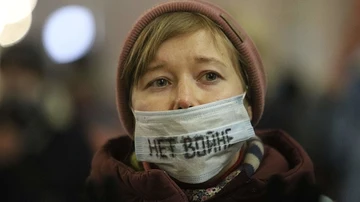In Russia people he does not talk about politics openly as happens in Spain. “They don’t shit on Putin as openly as we Spaniards do on Pedro Sánchez or we did on Casado.” People in Russia are afraid to express their opinion in everyday situations. Few do, but fortunately there are people who speak up. Miquel Lluís Beltrán Campaign He is a history teacher at a public high school in Moscow, where he has lived for a few years. He knows the conflict up close and in its two versions: the Russian and the Ukrainian. Or rather, he knows all the positions that exist in these two countries because there are not just two versions.
In Russia there is a nationalist sentiment similar to the United States. Despite this, this Thursday there was a response from society in the form of demonstrations in some cities, such as Moscow and Saint Petersburg. Nail concentrations that ended with 1700 detainees in a few hours. Protesting in Russia is complicated. “There is a Demonstration Law that in various articles resembles the Spanish Gag Law. The pickets must be made of a person. If there are two people holding a sign the police can intervene. We cannot think that yesterday in Russia there could be demonstrations like the ones that took place in some Spanish cities of No to the war in Iraq”. At this point, the historian rescues a fact that seems significant to him: “No to Putin was this Thursday number two on Twitter.”

There is also nationalism. There is support for Putin. This is explained as follows: disappearance of the Soviet Union worries and much to the Russians. This is reflected in the surveys carried out by statistical centers or the media in Russia. Putin himself has also pointed out: “The disappearance of the Soviet Union is the greatest tragedy in the history of Russia.” It also depends on who you talk to, says the expert. “You can listen to very putinist speeches who point out that the Ukraine was a creation of Lenin. In the background there is a recognition of the greatness of the Soviet Union as a multicultural empire. The idea of empire has not changed. There are people who are proud of this imperial past, some focus more on the aspect of the Soviet Union, others remain communists and socialists. But everyone is proud of victory over the Nazis in World War IIsomething that they recognize in Stalin, and that Russians of diverse political sensibilities do”.
However, he insists that the Russian society is afraid to express an opinion. “In general, people are afraid. They prefer to go over the subject, they prefer not to deal with it, either when talking about historical memory or about Putin. For example, yesterday in class one of my students, 17 years old, told me when she entered that I was very sad about the invasion and that people had to mobilize. Then another girl came and said that it didn’t affect her at all. There were people in class who spoke out, others didn’t.” The history teacher says the situation is even more exaggerated with adultswith your co-workers. “It is a situation that I had not experienced in Spain. People are afraid of losing their jobs.” So he remembers that professors and students who had participated in the mobilizations in defense of Navalni were expelled from schools and universities. “I have a student to whom they went home to explain the article of the criminal code for having participated in the demonstration,” she adds.
“Despite this, there is dissidence and fortunately among young people more and more.” Of course, there are many people who support Putinism. The answer lies in the historical context of Russia. The decade of the 90 was a bleak time for Russia. “Moscow was controlled by gangs. My father-in-law told me that he queued for hours and hours to get powdered milk,” says the expert. The historian believes that when Putin arrived he was lucky with the international economic situation. “Russia ever since he has done nothing but recover, obviously with cyclical crises. If we compare Russia with what it was in the 90s and now, it has nothing to do with it. That has worked in his favor. For many people Putin is the one who has recovered Russia from the economic crisis.”
The expert points out that the crimean recovery It also made him gain support. “There was a moment of nationalist exaltation.” However, the historian acknowledges that this popularity for a few years is coming down in a very important way. “From Crimea and Ukraine, Russia has experienced a very difficult situation with sanctions. This has hindered its economic growth, but it has been maintained. On the other hand, the Navalni issue has affected Putin. He has been the tip of the iceberg. Also the corruption scandals of Putin and those close to him. The repression”.
Source: Lasexta
Mario Twitchell is an accomplished author and journalist, known for his insightful and thought-provoking writing on a wide range of topics including general and opinion. He currently works as a writer at 247 news agency, where he has established himself as a respected voice in the industry.











